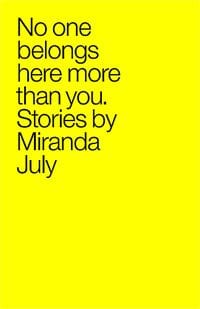
It’s a plea, really, the title of Miranda July’s debut collection of stories. After reading all 16 of them, the reader comes away with such insights as (1) these narrators don’t fit into the rickety cosmos they’ve imagined for themselves; (2) these narrators all sound like the same person; and, (3) I didn’t know you could practice swim strokes on the kitchen floor, and have a fine time doing it.
The latter revelation comes courtesy of The Swim Team, the second story presented in this talented and, at times, uneven assemblage of lives endured in fantasy, in despair, in the hope that some small pivot will set the lost squarely on love’s path again.
And the kinds of love desired vary and they arrive, or do not, in startling places. Maria finds hers while marooned in the small hamlet of Belvedere, where she teaches three octogenarians how to swim on the linoleum floor of her apartment. Her entire week is now pinned on the two hours she whistles and claps her class through the butterfly. With this mission, she has purpose, and warm casseroles brought by students. For a brief time she is saved.
As is the narrator who crushes on her neighbor straight through his epileptic seizure, or the one who submerges herself in an escapist romance with Britain’s Prince William. July does not often give her narrators names but she does imbue them with a nuclear kind of imagination, one that offers them a quick snippet of relief from their burdens. These include repressed dreams, bald longing, unacknowledged or even unknown sexuality.
There’s a lot of sex in these pages, and most of it occurs in the narrator’s mind. For many of these characters, it would be too risky to leave the confines of what they’ve pictured as perfection. They watch, react and take painful detail of plain but loaded moments. Runaway dogs become lessons in doom, white cloth napkins a veil between a crappy job and romance. Most of these twists are delicate and creep upon the reader slowly, so it is only at tale’s end that the full canvas is revealed.
It is one of July’s strengths as a storyteller how she can take the most ordinary scene and blow it up into an epic of sacrifice or faith or motherhood. When her characters do take the tiniest of sidesteps toward anything, one doesn’t see them coming.
We do not expect the pining teen of Something That Needs Nothing to pimp herself for love and money, or to take a job at Mr. Peeps Adult Video, just as we’re surprised how she pulls herself out of the mess by shouting out she’s quitting — over the course of an hour. “If no customers came in, I would yell the word `quit.’ As in no more, enough, I’m going home. I stared at the door. It threatened to open with each breath I took, with each passing minute. One. Two. Three. Four. Five. Six. Seven. Eight.”
July ends several of her stories with her characters’ humble efforts at change. But they are enough; we buy into them because the voices behind the act are so commanding. This is probably the collection’s biggest gift but also its most obvious flaw. There is no mistaking each character in each story as anything but one voice, whether July assigns it to a middle-aged woman, an adolescent girl, an obsessed man or, as found in This Person, an omniscient blend of first person and Gertrude Stein. It’s all the same narrator immersed in her own wanting.
As powerful as the voice is, July often relies too much upon it. Some stories could use less exposition and more scene. The amount of time spent inside a main character’s head can be exhausting, as is the case in the self-indulgent opening sequence of Making Love in 2003, where an aspiring writer recounts her love affair with an imagined, or possibly not, “dark shape,” whatever that means, and we don’t know because the recollection is too long and abstract and without any real world markers. The story only sparks in the moments when she moves through the tangible — she’s thinking, yes, but also speaking with others, involved in an inappropriate affair (is there any other kind?), or teaching special needs students how to read.
It’s easy to forget this is July’s first collection of stories; her pedigree is weighty. She’s already an accomplished artist who’s exhibited at the Whitney Biennial, a prize-winning filmmaker (Me and You and Everyone We Know), and has even recorded on the Kill Rock Stars label. But it is her first foray into short fiction writing and as such she is bound for missteps. They are, however, small enough not to eclipse the many bright delights this book brings.

![Call for Papers: All Things Reconsidered [MUSIC] May-August 2024](https://www.popmatters.com/wp-content/uploads/2024/04/all-things-reconsidered-call-music-may-2024-720x380.jpg)



